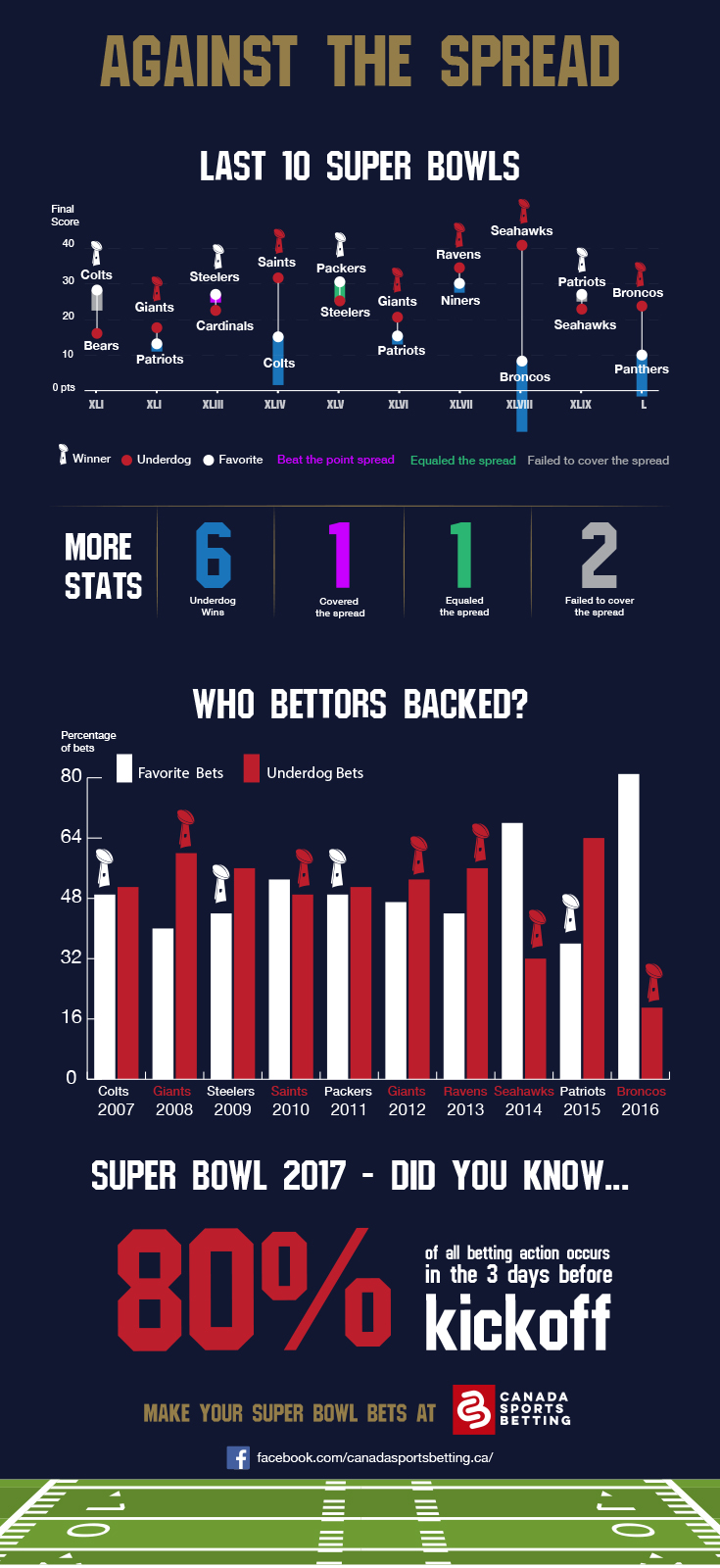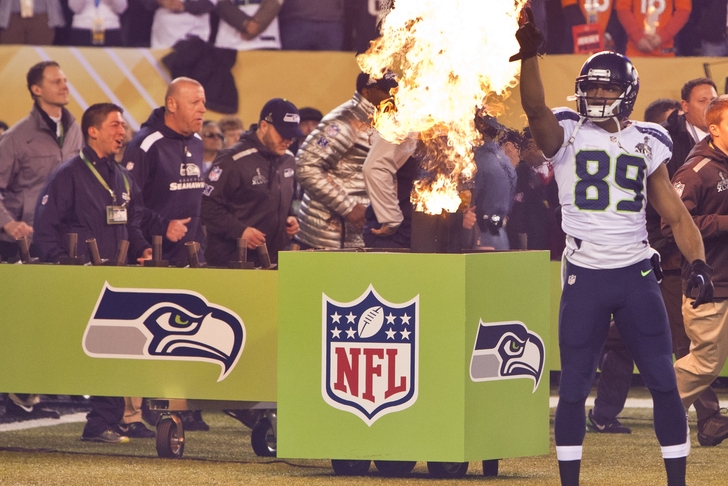Most sports fans love underdogs when they’re not rooting for their own team. Nobody loves underdogs more than NFL fans who win an underdog wager. When teams perform above expectations, the audience gets to share in a feel-good story, while betting geniuses feel good about winning an unlikely wager.
The Super Bowl used to be dominated by point spread favorites, leading to the creation of Super Bowl money lines and prop bets that spiced up the variety of wagers available to a bored NFL betting crowd. Few could predict that the past two decades would witness a complete turnaround of favorites handily beating the spread. Underdogs have been the most dangerous competitors in the Super Bowl lately, demanding respect from NFL fans placing a bet on the big game.
Underdogs Overcome Recent Lines
When you look at the Super Bowl spread over the past five years, you’ll notice that underdogs have dominated results. Not only have they beat the spread, but they’ve won straight up each time. Super Bowl 50 was the biggest upset out of the bunch, with Carolina listed as five point favorites before the kickoff. With the exception of the Baltimore Ravens, who beat the San Francisco 49ers by a field goal in Super Bowl XLVII, the underdogs went above and beyond, beating the spread attached to the favorite.
Over the past 16 years, eleven spreads have fallen to the underdogs, with nine of the teams winning outright. This means that betting against the spread results in a winning percentage of 68.8% over this period of time. In the world of sports wagering, this represents a massive trend, especially when a 60% winning rate is considered gold within the top ranks of the industry.
Isolating the cause of the trend is difficult, perhaps even impossible. Sportsbooks tend to have a solid handle on oddsmaking, aided by computer models and expert opinions. If anything, a string of surprise results is a testament to the unpredictability of sports, in particular a one-game championship such as the Super Bowl.
No one predicted the 43-8 whipping the Seattle Seahawks placed on the Denver Broncos in Super Bowl XLVIII. No one fathomed that Pete Carroll would call a pass play on the one-yard line with NFL TD leader Marshawn Lynch ready to rumble over the plane. These things happened, greatly altering the outcome of both Super Bowls, much to the delight of anyone betting on the underdog.

Favorites Were Sturdier Back In My Day
The get-off-my-lawn crowd will remember when a favorite was a favorite, sturdy and built to overcome any challenge presented by underdogs during the Super Bowl. Prior to the turn of the millennium, overwhelming favorites were considered a problem in the Super Bowl, perceived to reduce interest in the event, including wagering. “Wide right” and “The Guarantee” stood out as the most dramatic underdog results of the first three decades of Super Bowl action.
During this era, 21 out of 31 Super Bowls winners beat the favorite spread, with a 14-point push when Green Bay defeated New England 35-21 in 1997. A 67.7% winning rate makes much more sense mathematically when it comes to betting on point spread favorites. The 1990s were particularly harsh to underdogs, when favorites averaged a projected point spread of nearly 11, including five straight Super Bowls with spreads of ten or greater.
Amusingly, the tide appeared to change when the universe finally allowed John Elway to win a Super Bowl ring. In 1998, the Packers were considered 11-point favorites over the Denver Broncos. Bookies didn’t take Terrell Davis into account, who ran through literal blinding migraines to pick up 157 yards, three TDs, a Super Bowl MVP trophy and a ring. This landmark win served as a harbinger of the next century, inspiring QBs like Eli Manning and Tom Brady to overcome the odds on multiple occasions.

An Unexpected Underdog Twist
The NFL schedule doesn’t guarantee that Super Bowl teams will meet in the regular season. More often than not, the two teams making it to the championship do not meet in during the 17-game campaign. As such, football betting aficionados don’t benefit from statistics derived during a recent meeting on the field. In some cases, teams meet for the first time in a few years during the championship game, leading instead to a rematch during the next regular season.
Nevertheless, a total of 13 Super Bowls have been contested by teams which have previously met in the same season. One would expect that the outcome of the Super Bowl would mimic the regular season, but the record for prior winners is only 6-7. This implies that underdogs tend to do well in this scenario.
Appropriately, since 2000, teams which lost the initial regular season game have been 1-4. Losers went on a three-game win streak during Super Bowl XXXIV, XXXVI and XLII. The 2012 New York Giants broke this trend, defeating the New England Patriots in the regular campaign and Super Bowl XLVI – both times as underdogs.
Regression To The Mean: An Unstoppable Force
Without getting into too much mathematical detail, the idea of numbers regressing to the mean revolves around equilibrium. If a perfectly average team performs 10% better than expected for the first five games of the season, there’s a good chance that they’ll come back down to earth by performing about 10% worse than average for the next five games. Over this ten-game sample, the team performed exactly as expected, because they regressed from above average back to average.
In this context, it’s not entirely surprising that underdogs would experience a strong winning trend against the spread since 1998. Before 1998, favorites won about two-thirds of their Super Bowl games against the spread. Afterwards, about two-thirds of underdogs have managed to beat the spread. This doesn’t suggest that the mean for underdogs versus favorites involves a 50-50 split. Logically, the ratio of favorites winning against the spread should be better than underdogs by any standards.
Predicting the beginning and end of long-term trends is exceedingly tough, requiring a keen sense of NFL history and a firm grasp on the zeitgeist of the sport. For Super Bowl LI, ignoring the underdog disregards one of the strongest modern betting trends. Certainly, favorites will once again rule the roost, but until a new trend has been established, bettors should beware of Super Bowl underdogs.
Back to the NFL Newsfeed